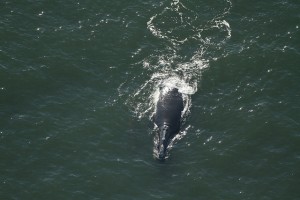Jacksonville, FL — Has marine life been washing up dead onshore on the Gulf Coast?

That’s the question then-councilman Robin Lumb asked an oil industry consultant at the Jacksonville City Council meeting last June when a resolution to ban seismic testing for oil and gas exploration off Florida’s east coast was introduced.
“[T]here have been no mass kill-offs of marine life as a result of seismic testing. Is that a correct statement?” Lumb asked.
“That is correct, sir,” said the consultant.
But that’s not really how it works, according to a recent letter from 28 marine biologists to the Obama administration.
It’s not that the blast of seismic airguns kill marine life outright. It’s that the noise alters behavior which impacts the whale’s survival.
“Airgun surveys used for oil and gas exploration are known to have large-scale effects on baleen whale species, including the disruption of activities vital to foraging and reproduction …,” the letter says.
In other words, with all that underwater rat-a-tat-tatting, a whale fella can’t get a bite to eat, and he can’t get any conversation with a lady. It’s like trying to have an amorous evening with the White Stripes, a heavy metal band, blasting in the background versus a little Barry White. The stress of being driven from food and kept from a mate won’t kill a whale outright, but could affect its survival long term.
In fact, after decades of a slow come back from the brink of extinction, the North Atlantic right whale now appears to be declining again, say the scientists.
The April 14 letter to Pres. Obama expressed “profound concern” over the survival of the North Atlantic right whale because of several factors. It says that entanglements in commercial fishing gear cause physical harm that the whales often can’t recover from and seismic blasting causes “chronic stress” to whales.
Originally, right whales were hunted almost to extinction in the early part of the 20th century. After hunting was outlawed, ship strikes were the leading cause of death. Then protections were put in place off the Florida and Georgia coasts requiring ships to monitor for whales, and slow down or alter course when encountering the slow-moving whales.
Many species of whales migrate through the waters off the Florida east coast, and right whales spend the winter months here. They give birth and nurse their young in the southeast Atlantic’s warm coastal waters, migrating back up to Maine and Nova Scotia for the summer and fall.
Florida has an extensive network of citizen volunteers, about 800 in all, who monitor the Atlantic Ocean from shore from December through May. They report whale sightings to the Marine Resources Council, who relays the location to a network of agencies, including the U.S. Navy, to alert commercial vessels to the location of the whales. Below is a tweet put out by the council earlier this spring when several citizens and the media were monitoring a mother and calf pair in Sebastian Inlet.
North Atlantic right whales make it safely out of the Sebastian Inlet! #LagoonLife #rightwhales #wildlife #nature pic.twitter.com/hr0r1OVo8C
— MRC (@MRC_IRL) February 9, 2016
But the slow success of the population may now be in danger according to the letter.

In March, the Obama administration reversed its plan to allow gas drilling off the Southeast Atlantic Coast due in part to objections by 110 coastal communities, as Florida Field notes reported at the time. According to international ocean advocacy group, Oceana, 30 Florida communities had passed resolutions to ban offshore drilling. Several Northeast Florida communities passed resolutions, but the city of Jacksonville voted it down.
But the March drilling ban didn’t prohibit seismic testing, which is what the current letter is now asking the Interior Department to do, at least until the National Oceanic and Atmospheric Administration’s (NOAA) 2017 status review of the whales.
The letter was signed by 28 marine biologists with “specific expertise on the North Atlantic right whale,” from Boston University, Cornell University, Duke University, University of North Carolina, the New England Aquarium, and Woods Hole Oceanographic Institute, among others. International organizations represented included the Nova Scotia Museum of Natural History, the Scottish Marine Institute, and Scotland’s University of St. Andrews.

